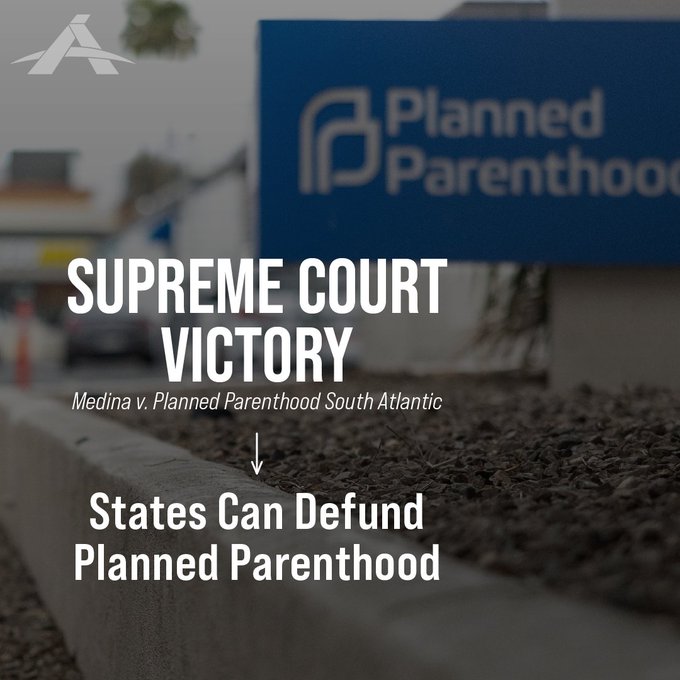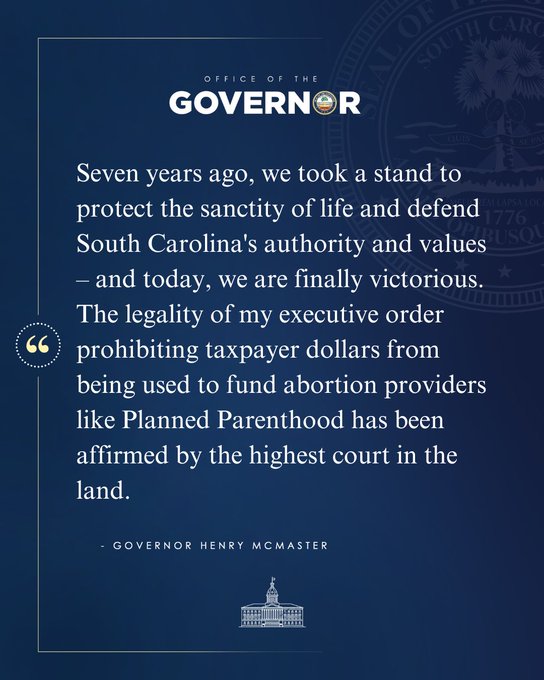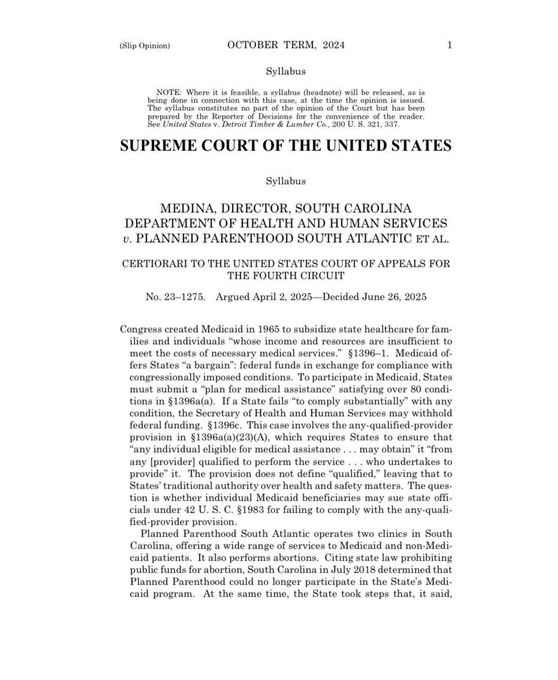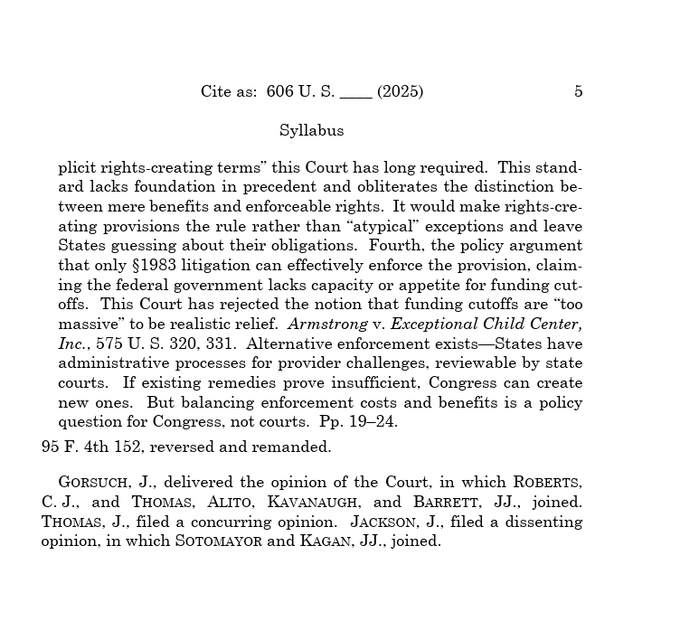🚨 BREAKING: Supreme Court rules for South Carolina! States are now free to defund Planned Parenthood and redirect taxpayer dollars to real, life-affirming care. This is a major win for South Carolina—and a path forward for every state that wants to stop funding abortion and

US Supreme Court rules states can defund abortion providers like Planned Parenthood
US Supreme Court rules states can defund abortion providers like Planned Parenthood
A decision from the U.S. Supreme Court in the case of Medina v. Planned Parenthood South Atlantic will allow states to redirect taxpayer dollars away from abortion facilities like Planned Parenthood. The vote was 6 to 3, with liberal members of the Court in opposition.
“States are now free to defund Planned Parenthood and redirect taxpayer dollars to real, life-affirming care,” Alliance Defending Freedom, a pro-life legal group which represented the director of the South Carolina Department of Health and Human Services in the case, wrote on X:
Key Takeaways:
In the case of Medina v. Planned Parenthood South Atlantic, the U.S. Supreme Court decided that states may redirect Medicaid dollars away from abortion providers, even if they offer other services that qualify for Medicaid dollars.
Three states (Arkansas, Missouri, and Texas) had already defunded Planned Parenthood prior to this case.
In South Carolina, the governor had issued an executive order (EO) defunding abortion providers from the state’s Medicaid program, regardless of other services they might provide. The Court decision affirms the legality of this EO.
The U.S. government under the Trump administration, as well as 18 states, had submitted amicus briefs urging the Court to allow states to defund abortion providers like Planned Parenthood.
The Backstory:
A dispute arose when Planned Parenthood South Atlantic (which commits abortions and operates two clinics in South Carolina) also offered other services to Medicaid and non-Medicaid clients. South Carolina state law prohibits abortion facilities from receiving Medicaid funds.
“Planned Parenthood and a patient who sought contraception sued under a federal civil rights law, and a federal trial judge blocked the South Carolina directive, saying that it ran afoul of Medicaid’s requirement that patients may choose any qualified provider,” wrote the New York Times.
According to the pro-abortion organization KFF, “South Carolina’s Governor McMaster (R) issued an executive order” in 2018, “prohibiting any clinic that provides abortion care from participating in the state’s Medicaid program. The order states that the state funds used to reimburse providers could be used to indirectly subsidize abortion care even though Medicaid only pays for non-abortion family planning services.”
It has long been known that funds which support facilities that provide abortions along with other services are fungible — meaning, those funds are paying for the same building, same utilities, same provider salaries, etc., and therefore, those funds are indirectly supporting the business of abortion.
KFF added:
The executive order had a direct impact on the Planned Parenthood clinics that offer abortion services in the state… but also offer enrollees other Medicaid-covered services including contraceptive care and STI screening and treatment.
The state has historically reimbursed these providers for the non-abortion medical care they provide to Medicaid enrollees just like it pays for all other medical care.
The federal Hyde Amendment bans the use of federal funds (including Medicaid) from being used to pay for abortions unless the pregnancy is a result of rape or incest or endangers the life of the pregnant person.
The organization noted that the Supreme Court was focused on don one main question: “Can a Medicaid beneficiary bring a civil action to enforce the Medicaid Act’s free choice of provider?”
“The larger context for this case involves how a state determines who is a qualified provider, even though the Supreme Court is more narrowly focusing on private right of action,” KFF noted.
The Details:
“Citing a state law prohibiting the use of its own public funds for abortion, South Carolina announced in July 2018 that Planned Parenthood could no longer participate in the State’s Medicaid program,” Justice Neil M. Gorsuch pointed out in the Supreme Court opinion. “At the same time, the State took steps that, it said, would help ensure that a ‘variety of other nongovernmental entities and governmental agencies’ would continue to provide ‘access to necessary medical care and important women’s health and family planning services.’”
The opinion noted that South Carolina has “140 [other] federally qualified health clinics and pregnancy centers, not counting the numerous private health providers who accept Medicaid.” However, Planned Parenthood and patient Julie Edwards filed suit against South Carolina’s Health and Human Services department, arguing “that South Carolina’s exclusion of Planned Parenthood from its Medicaid program violated the any-qualified-provider provision.”
The U.S. Supreme Court has affirmed our right to exclude abortion providers from receiving taxpayer dollars. Seven years ago, we took a stand to protect the sanctity of life and defend South Carolina's authority and values – and today, we are finally victorious. My statement:
“This case concerns one of the conditions state plans must meet,” wrote Justice Gorsuch in the Court’s opinion — namely “Medicaid’s any qualified-provider provision, as it is sometimes called.”
He added:
Medicaid offers States ‘a bargain.’ In return for federal funds, States agree ‘to spend them in accordance with congressionally imposed conditions.’ Should a State fail to comply substantially with those conditions, the Secretary of Health and Human Services can withhold some or all of its federal Medicaid funding.
This case poses the question whether, in addition to that remedy, individual Medicaid beneficiaries may sue state officials for failing to comply with one funding condition….
State plans must “satisfy more than 80 separate conditions” required by Congress, and “States must contribute their own money, too,” he wrote. “Historically, the federal government has provided on average about 57% of the funds required to implement Medicaid, and States have supplied the balance.”
Justice Thomas and original limits
Justice Clarence Thomas penned a separate opinion (concurring with the Court) discussing a federal statute [§1983] that allows “individual plaintiffs… to sue state or local officials who have deprived them of ‘any rights, privileges, or immunities secured by the Constitution and laws.’…”
Yet, Thomas pointed out:
The statute had “exceeded its original limits.”
“Early on,” the Supreme Court had “deemed [the statute’s] protection of ‘rights, privileges, or immunities’ to ‘refer to civil rights only.’
Case law “generally focused on ‘the rights that Congress had delineated in the Civil Rights Act of 1866,’ which ‘mandated racial equality respecting a citizen’s ability to sue and be a party in state court, to testify, to make contracts, and to buy, sell, and inherit property.’”
There has been a “jurisprudential shift” due to erroneous court decisions that broadened the intent of this statute.
“The Medicaid Act” just doesn’t fit the bill, as “… [C]onditional spending legislation does not itself ‘secure any rights.’”
“Accordingly, any third parties who benefit from those obligations cannot derive an enforceable federal right from the legislation.”
He noted: “When the would-be recipient of federal funds is a State, treating spending conditions as imposing mandatory obligations ‘would contradict the bedrock constitutional prohibition against federal commandeering of the States.'”
In addition, he took a “big picture” stance on that particular statute, pointing back to original intent:
We should revisit the threshold question of what constitutes a ‘right’ under §1983. Because we interpret statutes at the time of their enactment, see Loper Bright Enterprises v. Raimondo, 603 U. S. 369, 400 (2024), the answer to that question turns on how ordinary readers would have understood the phrase ‘rights, privileges, or immunities’ in 1871.
And, it seems more than likely that contemporaneous readers would have understood those terms more narrowly than our current §1983 doctrine does.
As Axios notes, Arkansas, Missouri, and Texas had already defunded Planned Parenthood prior to this case.
Commentary:
“The high court’s ruling means that the state can direct Medicaid funding—funds intended to help low-income individuals obtain necessary medical assistance—to comprehensive health care rather than entities that exist primarily to perform abortions,” Alliance Defending Freedom wrote. “The U.S. government, 18 states, numerous members of Congress, various medical practitioners in South Carolina, and multiple pro-life advocates submitted friend-of-the-court briefs with the high court supporting South Carolina’s freedom to direct Medicaid funding away from abortion facilities like Planned Parenthood and toward real, comprehensive healthcare for its citizens.”
ADF Senior Counsel and Vice President of Appellate Advocacy John Bursch, who argued before the court, stated:
States should be free to fund real, comprehensive care and exclude organizations like Planned Parenthood that profit off abortion and distribute dangerous gender-transition drugs to minors.
The American people don’t want their tax dollars propping up the abortion industry. The Supreme Court rightly restored the ability of states like South Carolina to steward limited public resources to best serve their citizens.
Live Action founder and president Lila Rose tweeted, “Taxpayers shouldn’t be forced to fund abortion. Let’s finish the job and defund them at the state & federal levels now!”:
BREAKING: The Supreme Court rules 6-3 in the Medina v. Planned Parenthood case that state Medicaid programs can defund Planned Parenthood. Taxpayers shouldn’t be forced to fund abortion. Let’s finish the job and defund them at the state & federal levels now!
Heartbeat International president Jor-El Godsey stated in response to the Court’s decision:
This is not just a legal win—it’s a moral one that will benefit real babies and families. We’re happy the Court has permitted South Carolina to redirect taxpayers’ hard-earned money away from the abortion industry and towards health care providers that protect women and preserve life….
This ruling is a victory–and an opportunity–for every state that is motivated to protect the unborn and invest in real healthcare….
Live Action News is pro-life news and commentary from a pro-life perspective.
Our work is possible because of our donors. Please consider giving to further our work of changing hearts and minds on issues of life and human dignity.
Contact editor@liveaction.org for questions, corrections, or if you are seeking permission to reprint any Live Action News content.
Guest Articles: To submit a guest article to Live Action News, email editor@liveaction.org with an attached Word document of 800-1000 words. Please also attach any photos relevant to your submission if applicable. If your submission is accepted for publication, you will be notified within three weeks. Guest articles are not compensated (see our Open License Agreement). Thank you for your interest in Live Action News!
Read Next

Bishops speak out as France approves assisted suicide bill
Cassy Cooke
·More In Analysis

Analysis
Pro-life laws don't need to be overturned. Doctors need to read them.
Nancy Flanders
·
Analysis
Planned Parenthood where teen died last year has injured another patient
Cassy Cooke
·
Issues
'DEFUND 250': 10 times Planned Parenthood's sex ed misled and groomed kids
Kelli Keane
·
Analysis
Pro-abortion professor steps down from director position at Notre Dame
Cassy Cooke
·
Analysis
'Pass the trash': How abortion is used to help conceal abuse in schools
Sheena Rodriguez
·More From Carole Novielli

Abortion Pill
Dear FDA: Who is overseeing the abortion pill's prescribers?
Carole Novielli
·
Abortion Pill
Louisiana AG faces FDA and abortion pill manufacturers in court
Carole Novielli
·
Investigative
Abortion training program violates federal law, says legal group
Carole Novielli
·
Investigative
'DEFUND 250': Taxpayer-funded Planned Parenthood helps to create more abortionists
Carole Novielli
·
Abortion Pill
Lawsuit: Louisiana suffered 'sovereign and economic harms' from FDA abortion pill changes
Carole Novielli
·


